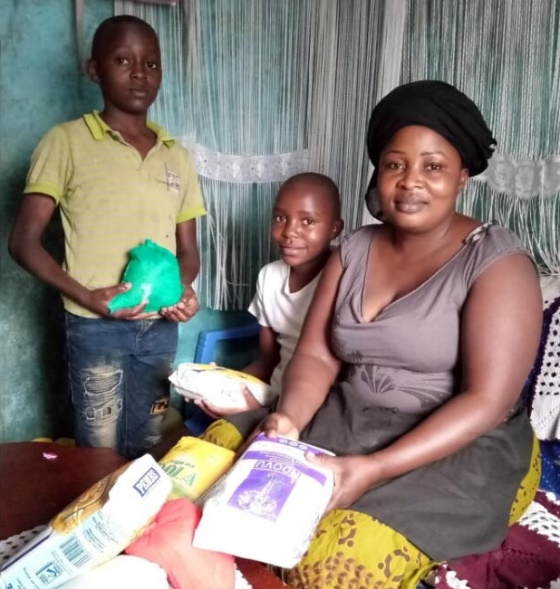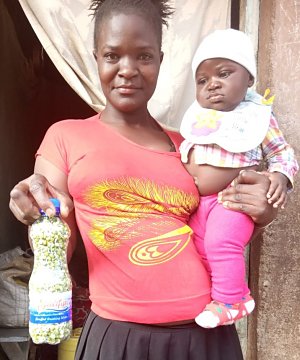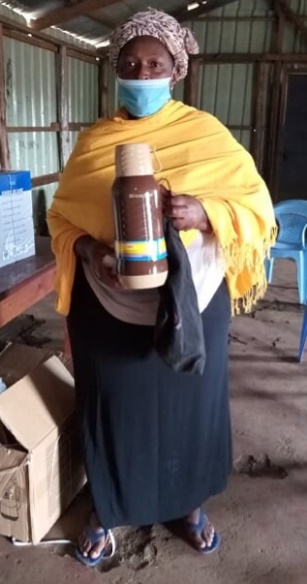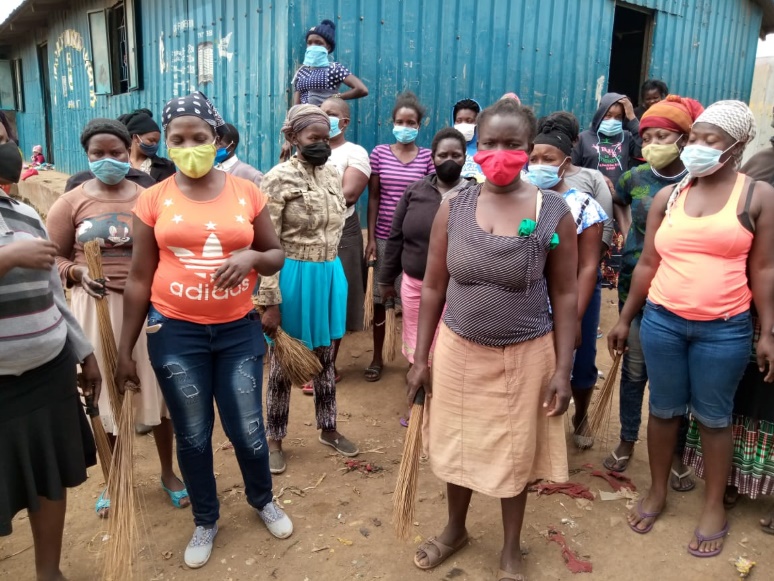
100 Families Project

In 2020, SHE joined forces with solar cooking expert Tom Sponheim, embracing his “100 families” project in Nairobi to lift up 100 families that sank into poverty due to Coronavirus pandemic effects. Using a new radically transparent model, donors’ funds are transferred to 100 families in need, and photos of each family’s usage of those funds are made public for all to see. Basic needs are met first, such as groceries, then, families work with Nairobi-based colleague Samuel Odhiambo to start businesses to achieve self-sufficiency, with some choosing to add solar cooking to their lives for increased savings. Keep on reading to find out more.
Thousands of families living in the Nairobi slums are locked down due to the coronavirus. While individuals are free to move about wearing masks and maintaining social distancing, the odd jobs that they have always found to support themselves have now mostly disappeared, leaving a large number of families without a source of income.
Aware of this immense need, Seattle resident Tom Sponheim set out to see what he could do to help at least some of these people. With the help of Samuel Odhiambo, a trusted colleague on the ground in Nairobi, they chose 100 families to focus on.
Since the end of April of 2020, every two weeks $10 has been sent electronically to each family to buy groceries. Each family then sends back a photo showing themselves with the groceries that they have bought. These photos are then uploaded to a cloud drive (OneDrive) where the photos are visible to all (view these photos here under the “transfer” albums).
After running the project for seven months with personal donations coupled with donations from friends and family, in November 2020, with the arrival of the sunny season in Nairobi, Tom contacted Solar Household Energy (SHE) for its expertise on adding solar cooking to the project for further fuel savings. SHE has now adopted the project and Tom has joined the SHE staff.
SHE is hoping to spread this new radically transparent model to other groups of 100 families to allow donors to participate in projects with the assurance that their donations actually make it to the people in need with very minimal overhead (SHE’s overhead is 6%).
Using this model, SHE also gets to the know the families so well that they can work with them to design a plan for them to become self-sufficient. In 2020, with the support of this project, 47 of the families created their own businesses, and 27 of these families reported that they were now self-sufficient and able to live off the profits from their business.
Nutrition
Groceries
As new technologies such as sprouting, and solar cooking have made it possible for the families to spend less money on cooking fuel, over time the amount of money provided for food has been reduced. In December 2020, each family received $6 every two weeks. As families become self-sufficient, their food money allotments are reduced and eventually eliminated. This frees up money to use to help the remaining families start businesses and strive toward self-sufficiency.

Sprouting
We noticed that most of the families bought flour, cornmeal, sugar, and cooking oil, which provide them with a very starchy diet. Only one family bought mung beans, but generally beans were too expensive to cook. Mung beans cooked faster than most other beans, but it still takes between one and two hours to cook them over a charcoal fire.
We have introduced the idea of sprouting mung beans, something that the families were apparently completely unaware of. Samuel estimates that about 80% of the families are now sprouting mung beans.
See photos of sprouting activities here.
Small business creation
Here is a sample of some of the types of businesses that have been established in 2020:
- Outdoor food stands
- Small grocery stores
- Popsicle vending
- Peanut roasting and selling
- Second-hand clothing sales
- Sewing businesses
- A for-profit lending library
- Hair salons
- Carpentry services
See photos of the businesses that have been created here.
Supported needs
During a recent transfer, families were asked to send back, along with their photograph with themselves and the food they have bought, a request for something that they need in their lives to help them get ahead. We carefully considered each of these requests and chose to support the ones that seemed the most practical and important. We ended up fulfilling approximately 30 of these requests. You can see the families in possession of their new items here.
Fuel savings
It must be remembered that most of the food that is supplied to our families must be cooked before eating. This has usually been accomplished by buying small amounts of charcoal to use as a cooking fuel. Samuel estimates that the cost of charcoal is 50% to 150% as much as the cost of the food that it is used to cook. Thus, by reducing the amount of money that the families need to spend on fuel, a gradual reduction in the amount of money provided for food is possible.
LPG stoves
Though it is more expensive to cook with charcoal than to cook on an LPG (propane) stove, charcoal is the normal cooking fuel since it can be bought in small quantities, while an LPG stove takes an outlay of $25-$35 for the stove and then approximately $9 to refill it with LPG. In 2020, twenty LPG stoves were donated to families for the following purposes:
- For families to share who live close to one another
- For families starting food-vending businesses
- For single women with large numbers of children
- For families with lung problems or other serious diseases
See photos of our work with LPG stoves here.
Thermoses
A pilot project showed that providing a 2-liter thermos to each family results in a fuel savings of $5 to $15 a month per family. Having established this fact, all 100 families were then provided with thermoses. The breakage rate in the first 5 months was only 2% and the thermoses that broke were replaced.
Chess Tournament
On December 5th, the 16 members of the Chess Club for youth held their first chess tournament, and the winners received their own chess sets.
See photos of the first Chess Tournament here.
Community building
The goal is to improve the lives and to make self-sufficient as many of the hundred families as possible. This may not be possible for every family. Thus, another goal is to build solidarity among the families so that at some point the families that have become self-sufficient will be able and willing to help those who have yet to gotten up on their feet yet. To this end, several initiatives to build community spirit and solidarity have been undertaken.
Neighborhood cleanup
The Kariobangi Slum, where the families live, is generally an area of desolation. This is apparent by the litter strewn on the streets and in other open areas.
Four times every month, it has become a popular activity for the families to gather together and do an extensive cleanup of a part of their community. Sometimes, even people outside of the 100 families group join in to help. This activity, aside from improving the community, allows the families to get to know each other better and provides a great example for people observing the activity.
See photos of community cleanup here.
Framed photos
To help build solidarity, we had one photo of each family printed and framed to include the words “The 100 Families project.”
Incidental assistance
Bereavement costs
Two families suffered the death of a family member during the 4th quarter. We assisted each of these families with a small amount of money to help pay for the burials. We also printed and framed portraits we had taken of the family member who passed and gave these to the families.
Help for the disabled and ill
During the 4th Quarter we fulfilled approximately ten special requests for small sums of money for medication or for travel costs to medical appointments.
Solar cooking
When the weather changed and Nairobi entered the dry season, cooking workshops were begun where the families are taught how to use a solar cooker. Construction then began on Haines 1 solar cookers and these are provided first to the families with the most need and interest.
Future plans
- Hot weather will bring the need for cooling to keep foods from spoiling, especially for the food vendors. We are working with pot-in-pot coolers that act as low-tech refrigerators. These will be made available for some of the families.
- SHE hopes to finish up with this first group of 100 families and adopt a second group where the lessons learned can be applied to improve the lives of the second 100 families even faster than with the first group.
Donating to this project
If you wish to donate to the project, you can make an online donation by clicking “DONATE” at the top of this page, and adding a note saying “100 families project.”
If you wish to donate by check, please mail your check with “100 Families Project” in the memo field to this address:
SOLAR HOUSEHOLD ENERGY, INC.
3327 18th St. NW
Washington, DC 20010





